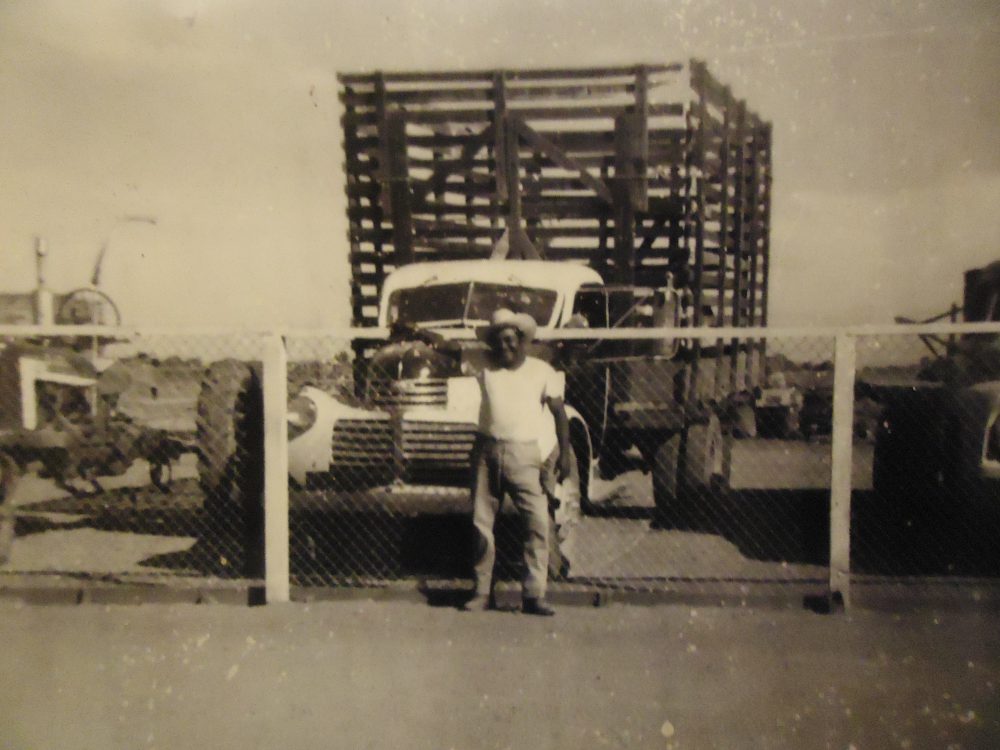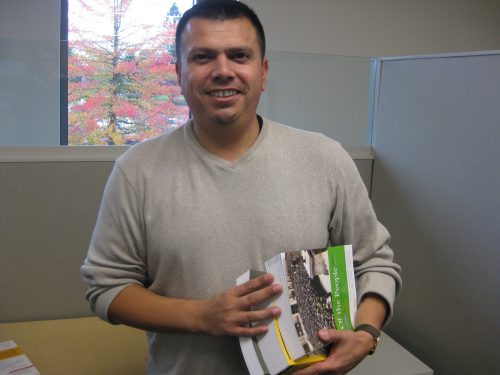This content was published: November 21, 2016. Phone numbers, email addresses, and other information may have changed.
History instructor Israel Pastrana educates community on federal Bracero Program
Photos and Story by Janis Nichols
 Israel Pastrana embodies contradiction.
Israel Pastrana embodies contradiction.
He dropped out of high school but has completed his doctoral studies. He was born and educated in San Diego but found his community in Tijuana, Mexico. He teaches U.S. history at PCC’s Rock Creek Campus, but the history that defines him is focused on his grandfather.
“My grandfather’s story, his experiences, defines my scholarship,” Pastrana said. “He was a guest worker, a Bracero, and because of him, I wanted to study the border and immigration.”
According to the Bracero History Archive, the Bracero Program grew out of a series of bi-lateral agreements between the U.S. and Mexico, and allowed 4.6 million Mexican nationals to cross the border as contracted laborers between 1942 and 1964. The program was designed to address anticipated farm labor shortages caused by both World War II and the Korean conflict. The agreement was supposed to be temporary and highly regulated, protecting both the Braceros and domestic workers.
Over time, it was neither.

In the four history sections he teaches, Pastrana covers U.S. history from the Colonial Era to World War I, but his doctoral work is focused on the Bracero Program.
History tells us the Mexican guest workers were often mistreated and in addition to being underpaid, they were forced to contribute 10 percent of their earnings to a “savings fund.” The money was sent to Wells Fargo Bank and Union Trust Company for eventual transfer to Mexican banks that would repay the Braceros when they returned to Mexico. For the vast majority of Braceros, the money disappeared.
“I have my grandfather’s original work contract, but he missed that brief window of time to collect and was not compensated,” Pastrana said. “I tell him that I have benefited from his labor and that makes him proud.”
Pastrana teaches that the Bracero Program started out with good intentions and solid guidelines that were meant to protect workers on both sides of the border.
“During the war years, the guest worker program was highly regulated,” he said. “Employers could also help migrant laborers obtain legal residency. It’s much harder for Mexicans to gain legal status today.”
In the four history sections he teaches, Pastrana covers U.S. history from the Colonial era to World War I, but his doctoral work is focused on the Bracero Program. Looking through that lens, it explains his passion for equity and social justice. Last summer, he led a social justice workshop for student government leaders. He has connected with Rock Creek’s Multicultural and Women’s Resource centers, and he is a member of the campus’ Diversity Council.
Pastrana said he believes that financial success at home rather than migration is the key to Mexico’s future.
“I think comprehensive migration reform is inevitable and that the guest worker program will be revitalized to allow workers access to temporary jobs while maintaining residence in Mexico,” he said. “Whether this will replicate the problems with the original Bracero Program remains to be seen.”
And in Pastrana’s immediate future is the chance to be home for the holidays: He’ll spend Thanksgiving with his grandparents in Tijuana.


Thank you for sharing, Israel. I am glad to be working with you and I look forward to hearing about the connections that students make. Sounds like a wonderful opportunity.
I have thoroughly enjoyed his class and approach to educating and teaching. He is engaging and very personable… its been a pleasure.
Pelon, (Israel’s childhood nickname)
Proud of you little guy…hard to beleive we once shared a bedroom growing up!! Keep up the good fight we are all extremely proud of you!!
Luis
Israel: I am so glad you are part of the PCC familia!. Our students are so proud of you and you are an amazing role model. I love your nick name.
Con respeto.
You are an inspiring American story.
Israel is a phenomenal professor. He has been one of the best history teachers that I’ve had. I’m so glad that I took his history class. I hope that all of my instructors had his way of teaching. He engages students, and promotes learning. Thank you Pastrana! I look forward to taking other courses that you might be teaching in the near future “History of Hip Hop”